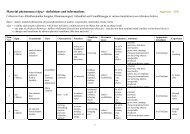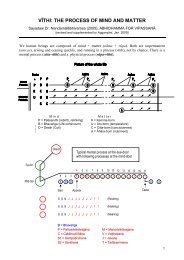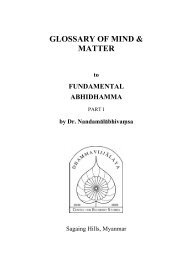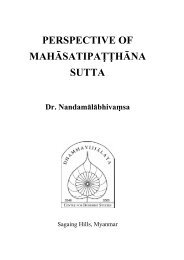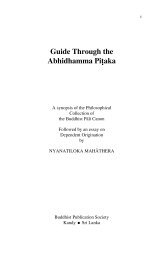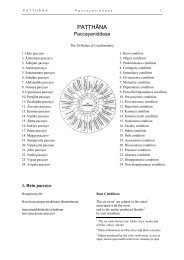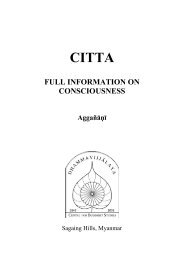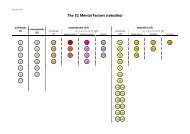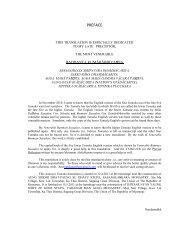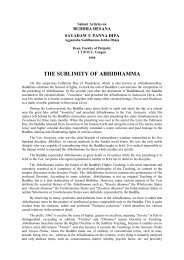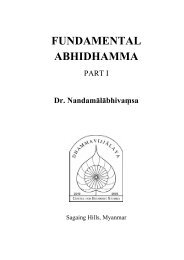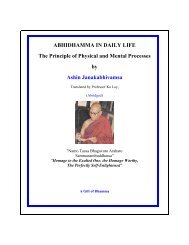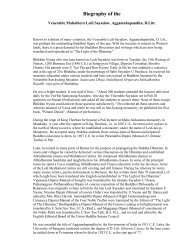Process of Consciousness and Matter - Abhidhamma.com
Process of Consciousness and Matter - Abhidhamma.com
Process of Consciousness and Matter - Abhidhamma.com
You also want an ePaper? Increase the reach of your titles
YUMPU automatically turns print PDFs into web optimized ePapers that Google loves.
INTRODUCTION<br />
This book is intended for all serious students <strong>of</strong> the <strong>Abhidhamma</strong>.<br />
It serves as supplement to Bhikku Bodhi’s book A Comprehensive<br />
Manual <strong>of</strong> <strong>Abhidhamma</strong>, <strong>and</strong> treats various important aspects in more<br />
detail - in particular the process <strong>of</strong> consciousness.<br />
All Buddhist teachings, including all the multitude <strong>of</strong> different<br />
schools <strong>and</strong> approaches, have the same basic aim - to attain liberation.<br />
In Buddhism liberation means be<strong>com</strong>ing free from the limited<br />
boundaries <strong>and</strong> the suffering that characterise our samsaric existence.<br />
The Buddha taught that we can only realise this liberation by means <strong>of</strong><br />
our own efforts, directed towards a deep underst<strong>and</strong>ing <strong>of</strong> ourselves<br />
<strong>and</strong> the world around us. We will not realise such an underst<strong>and</strong>ing<br />
simply by being “h<strong>and</strong>ed it on a plate” by someone else, however<br />
exalted or even divine that person or being is.<br />
Buddhist teachings may be regarded as having two main str<strong>and</strong>s:<br />
conventional teachings <strong>and</strong> ultimate teachings. The main repository <strong>of</strong><br />
the Buddha’s conventional teachings is the Sutta Pitaka. In these<br />
suttas most <strong>of</strong> the teachings are directed towards ethics, <strong>and</strong> explain<br />
how people caught up in samsara can live their lives in a kinder <strong>and</strong><br />
more wholesome way. The Buddha knew that many, even most,<br />
human beings will not achieve liberation immediately. What they<br />
must therefore do is to try <strong>and</strong> move gradually towards liberation.<br />
Depending on their past kamma <strong>and</strong> their present effort, they may<br />
realise liberation in this life, or it may be in their next life, or in some<br />
future life.<br />
In the “ultimate” teachings <strong>of</strong> the Buddha however, as presented<br />
in the <strong>Abhidhamma</strong> Pitaka, we are provided with another perspective.<br />
The <strong>Abhidhamma</strong> talks in a more abstract way than does the Sutta<br />
Pitaka. The teachings in the <strong>Abhidhamma</strong> (which means teachings<br />
that are “special” or “supra mundane”) define the universe in terms <strong>of</strong><br />
nāma rūpa, i.e. mental <strong>and</strong> material phenomena. The aim <strong>of</strong> the<br />
<strong>Abhidhamma</strong> is to lead us towards a deep underst<strong>and</strong>ing <strong>of</strong> the true<br />
nature <strong>of</strong> ourselves <strong>and</strong> the world around us. In order to attain final<br />
1



